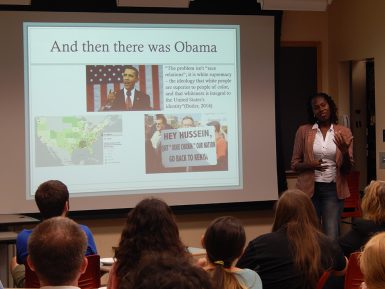Banjo discusses post-racialism, media

Omotayo Banjo, a communications scholar from the University of Cincinnati, kicked off the semester’s first Third Half research talk with a discussion of post-racialism, or the assumption that race is no longer an issue in the United States because of advances in civil rights and social justice.
In “A Whole New World? Media’s Post-racial Utopia vs. Our Current America,” Banjo illustrated the ways that race influences how media producers create content, as well as how consumers receive it. She paid particular attention to television characters who serve as stand-ins for their cultures of origin.
“We see this a lot with characters of color, where they just put them in and make them represent their whole continent,” she said.
At issue in discussions of post-racialism is what Banjo described as whiteness. In her research, she has found that representations of race in the media often reinforce the privilege of those in power.
She was careful to note that the term whiteness is not meant to describe a person or group, however.
“When I talk about whiteness, I don’t necessarily mean white people,” she said. “But there’s an ideology that what is white—what is European—is best.”

A telling example comes from the ABC sitcom Fresh Off the Boat. In one episode, the son of Chinese immigrants says he no longer wants his mother to pack Chinese food in his lunch. Instead, he prefers “white people food,” which allows him to make friends and gain social capital at school.
Although the clip is played for comedic effect, Banjo explained that it’s still a problematic representation of race, as the foods associated with whiteness are also associated with power.
The latter portion of the talk included examples of television shows that Banjo described as “strengths” in discussions about post-racialism. For example, the recently canceled Cristela challenged the status quo with its humorous but critical Latina lead character.
In the end, however, she suggested that the public, not the film and television industry, are the true leaders of the discussion.
“Hollywood isn’t always right,” she said. “Hollywood said no one wants to watch a movie with a majority-black cast. Straight Outta Compton has been No. 1 for two to three weeks.”
Banjo couched the entire talk in her experience as the daughter of Nigerian immigrants. Repeatedly, she referenced the issue of her variegated racial identity.
“My father taught me that I was not black,” she said. “I was Nigerian. And what made me Nigerian was the food that I ate, the way I interacted with my elders.”

These sorts of cues initially caused her to assume the post-racial attitude that she now critiques in her research. The accomplishments of civil rights leaders like Martin Luther King Jr. once made her think that race and racism were no longer such volatile issues, she said.
“In my little head, I actually believed that, because I didn’t have the black experience.”
A later experience complicated Banjo’s perspective. While studying at Penn State University, someone called her the n-word. It was then, she said, that she realized her skin color means something in this country.
A full room of faculty and student listeners composed the audience for Friday’s lecture. Moderator and associate professor Andrew Weaver said that “one of the intentions we have for this is to go beyond the traditional brown bag.” That includes premium coffee and refreshments.
Third Half lectures are scheduled to continue throughout the academic year.

